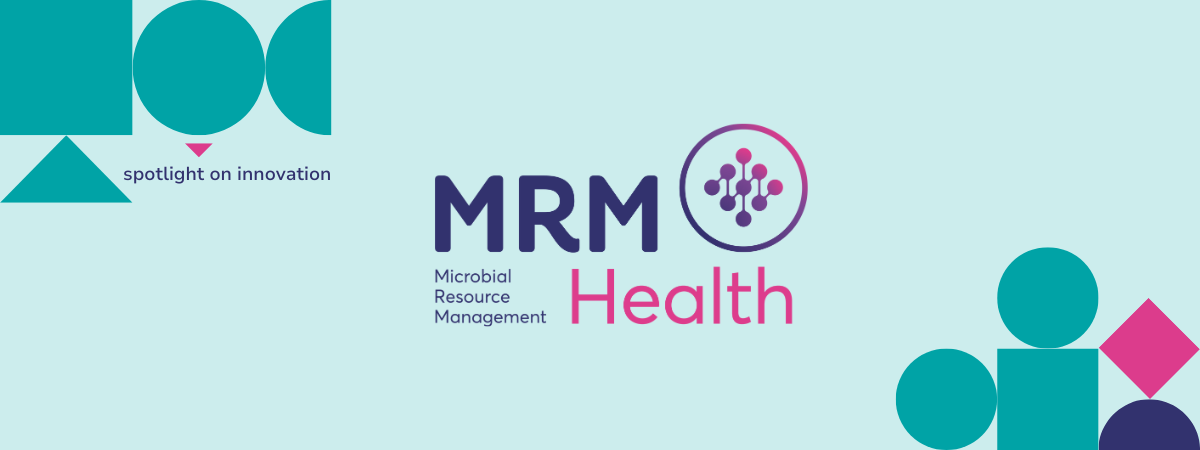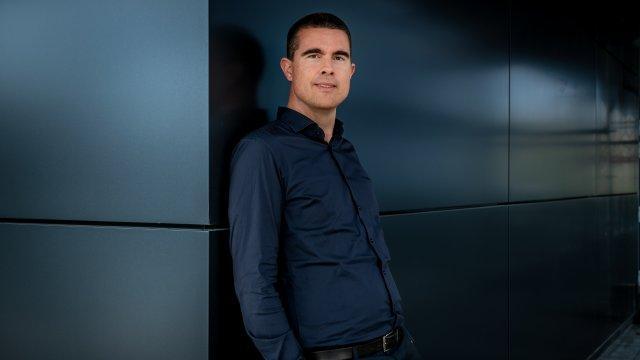MRM Health – Redefining Microbiome Therapeutics
June 25, 2025
.png)
In a world increasingly driven by precision medicine and natural, safer therapies, MRM Health is pioneering a new frontier: using live bacterial therapeutics to improve human health. Spun out of the VIB ecosystem and built on decades of microbiome research, the company is leading a transformative shift in how chronic inflammatory diseases are treated by targeting the gut microbiome – a complex, vital ecosystem often regarded as a separate organ due to its pivotal role in overall health.
Managing Microbial Resources
MRM stands for Microbial Resource Management, reflecting the company’s guiding philosophy: just as organizations require cohesive teams, the gut requires a well-managed community of beneficial bacteria. MRM Health designs therapeutic consortia that work synergistically to rebalance the microbiome and deliver a lasting therapeutic impact across a range of diseases.
Founded as a joint venture between MRM Technologies – the parent company of ProDigest – and VIB, MRM Health builds on over two decades of microbiome research. Initially incubated within ProDigest, a CRO business spun out from Ghent University, the team spent five years developing core technologies and setting up an initial pipeline – including a lead asset in inflammatory bowel disease (IBD) – before officially launching the company. Early strategic investment from Korys, which later transitioned to OMX Europe Venture Fund, provided the crucial momentum in 2020 to establish MRM Health as a dedicated biotech venture.
Collaboration with VIB was foundational. Professor Jeroen Raes (VIB-KU Leuven Center for Microbiology) contributed essential microbiome expertise and data, analytical tools, and a curated bacterial strain collection. Professor Dirk Elewaut (VIB-UGent Center for Inflammation Research) provided deep clinical expertise through longitudinal patient cohorts in spondyloarthritis, including both stool and gut biopsy samples, and preclinical mouse models. These collaborations supplied both the data and scientific insight needed to build disease-relevant microbial therapies.
Today, MRM Health continues to benefit from the VIB ecosystem, including ongoing projects exploring applications in different inflammatory diseases.
CORAL® revolutionizes Microbiome Drug Development
At the heart of MRM Health's approach is the CORAL® platform, which enables the rational design and simultaneous production of multi-strain live biotherapeutics in a single, integrated manufacturing process. Unlike early microbiome therapies that relied on poorly characterized stool samples, CORAL® enables the precise selection of bacteria tied to specific disease mechanisms, the combination of five to ten strains to target multiple pathways simultaneously, and the production of these consortia in a single, standardized, scalable fermentation run. This streamlines development and reduces costs, while ensuring consistency and safety – a key differentiator in this field.
Each person’s microbiome is as unique as a fingerprint. To ensure efficacy across such diversity, MRM Health designs bacterial consortia that include overlapping therapeutic functions and behave as a self-contained ecosystem. This design minimizes reliance on the patient’s existing microbiota and ensures consistent therapeutic action.
Pioneering Trials and Transformative Results
A pivotal moment for MRM Health came in 2021 with the launch of its first clinical trial for lead asset MH002 in ulcerative colitis (UC), followed shortly by a study in pouchitis, a rare and challenging late-stage condition. These milestones were achieved despite the operational challenges of launching a company at the height of the COVID-19 pandemic, a period that also made conducting clinical trials particularly demanding due to limited hospital capacity.

CEO Sam Possemiers, an experienced entrepreneur, reflects: “From concept to clinic under such conditions was both a personal and collective achievement.”
The Phase 1b/2a studies in mild-to-moderate UC and acute pouchitis demonstrated consistent efficacy and safety, including restoration of the intestinal environment, mucosal healing, and reduced colonic inflammation. Notably, no treatment-related adverse events were observed – marking the unique safety profile a first in IBD therapeutics. Patients responded enthusiastically to the therapy’s natural, non-immunosuppressive profile, resulting in rapid recruitment.
Encouraged by regulatory feedback from both the FDA and EMA, which would even allow a direct move to Phase 3, MRM Health has opted to conduct a Phase 2b study in UC (approximately 200 patients) to further optimize dosage and clinical design. For pouchitis, development can proceed directly to Phase 3 under orphan disease incentives.
In addition, MRM Health is advancing a diverse and strategic pipeline, including programs in Crohn’s disease and immune-oncology, as well as partnered programs such as in animal health.
A Novel but Promising Field
Live bacterial therapeutics are still an emerging field, hampered early on by poorly defined products that created scepticism. As a next-generation company, MRM Health is showing that with rational design, rigorous manufacturing standards, and clear mechanisms of action, bacterial consortia can safely and effectively treat chronic diseases.
MH002 stands apart from traditional therapies for inflammatory diseases with its non-immunosuppressive mode of action, making it inherently safer for patients. Unlike conventional drugs, MH002 aims to modify the underlying disease process rather than merely manage symptoms, and its natural, orally administered format offers a patient-friendly alternative to injectables like biologics.
Targeting Unmet Needs
MRM Health strategically targets an underserved patient segment: mild-to-moderate UC patients not responding to conventional treatments but not yet candidates for biologics. This accounts for up to 30% of the global UC population, or approximately 600,000 patients, offering a unique market entry point.
In pouchitis, the unmet need is even more urgent. Between 10-20% of UC patients ultimately undergo a colectomy. Surgeons create an internal pouch from the small intestine to avoid external stoma bags. However, this pouch often becomes inflamed (pouchitis), and current treatments rely on unsustainable antibiotics, which cause resistance. MH002 provides a non-antibiotic alternative which targets the underlying disease process, targeting both mucosal healing, inflammation and microbiome imbalance.
Looking Forward
Since its pandemic-era launch, MRM Health has built a robust team, advanced its R&D pipeline, and achieved early clinical success. The long-term ambition? To evolve into a fully integrated biopharma company capable of commercializing its own therapies.
“Our ambition is to make the microbiome a fully-fledged therapeutic modality,” says Sam Possemiers. “We’re proving that with the right science, the right platform, and the right partners – like VIB – you can turn even the most complex biology into real solutions for patients.”
.jpg)